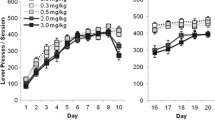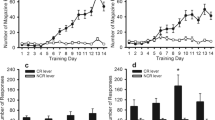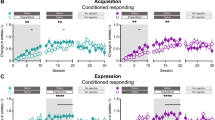Abstract
The effects of various doses of ethanol on DRL performance was examined in rats under conditions of cued and non-cued DRL tasks and under conditions of low versus high baseline performance criteria. The dose-level at which ethanol produced a significant reduction in number of responses and reinforcements interacted in a complex fashion with level of baseline performance, the cue conditions, and the order of DRL tasks. Generally, performance was impaired at a lower dose level for groups initially trained to a low criterion of DRL performance than for groups later trained to a higher criterion of DRL performance, regardless of cue condition. Further, the dose level at which ethanol impaired performance (as indicated by number of reinforcements obtained) under non-cued DRL conditions was lower than that for the cued DRL conditions, but only on the initial task where baseline DRL performance criterion was lower. Finally, the group with a higher baseline level of responding (i.e., poorer DRL performance) was more vulnerable to the disrupting effects of ethanol on this measure than groups with lower baseline response rates.
Similar content being viewed by others
References
Dews, P. B.: Analysis of effects of psychopharmacological agents in behavioral terms. Fed. Proc. 17, 1024–1030 (1958).
Gibbins, R. J., Kalant, H., LeBlanc, A. E.: A technique for accurate measurement of moderate degrees of alcohol intoxication in small animals. Journal of Pharmacology and Experimental Therapeutics 159, 236–242 (1968).
Holloway, F. A.: State-dependent effects of ethanol on active and passive avoidance learning. Psychopharmacologia (Berl.) 19, 1–23 (1971).
Holloway, F. A., Vardiman, D. F.: Dose-response effects of ethanol on appetitive behaviors. Psychonomic Science 24, 218–220 (1971).
Kirk, R. E.: Experimental design procedures for the behavioral sciences. Belmont, Calif.: Brooks/Cole 1968.
Laties, V. G., Weiss, B.: Effects of alcohol on timing behavior. Journal of Comparative and Physiological Psychology 55, 85–91 (1962).
Laties, V. G., Weiss, B.: Influence of drugs on behavior controlled by internal and external stimuli. Journal of Pharmacology and Experimental Therapeutics 152, 388–396 (1966).
McMillan, D. E.: The effects of ethanol on temporally spaced responding in humans. Journal of Pharmacology and Experimental Therapeutics 171, 159–165 (1970).
Mello, N. K.: Behavioral studies of alcoholism. In: B. Kissin and H. Begleiter (Eds.). The biology of alcoholism, Vol. 2: Physiology and behavior. New York: Plenum Press 1972.
Miller, N. E., Miles, W. R.: Alcohol and removal of reward: An analytical study of rodent maze behavior. Journal of Comparative Psychology 21, 179–204 (1936).
Singh, S. D., Manocha, S. N.: The interaction of drug effects with drive level and habit strength. Psychopharmacologia (Berl.) 9, 205–209 (1966).
Author information
Authors and Affiliations
Additional information
This investigation was supported by Public Health Service Grant MH 14702 from the National Institute of Mental Health awarded to the Senior Author's Project at the Oklahoma Center for Alcohol-Related Studies.
Rights and permissions
About this article
Cite this article
Holloway, F.A., Wansley, R.A. Factors governing the vulnerability of DRL operant performance to the effects of ethanol. Psychopharmacologia 28, 351–362 (1973). https://doi.org/10.1007/BF00422755
Received:
Revised:
Issue Date:
DOI: https://doi.org/10.1007/BF00422755




